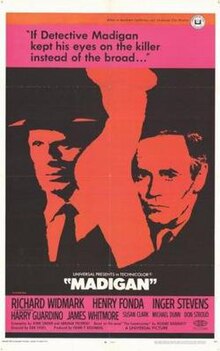|
Madigan
Madigan is a 1968 American neo-noir[2] crime drama thriller film directed by Don Siegel (as Donald Siegel) and starring Richard Widmark, Henry Fonda and Inger Stevens. The screenplay—originally titled Friday, Saturday, Sunday—was adapted by two writers who had been blacklisted in the 1950s, Howard Rodman (credited here under the pseudonym Henri Simoun) and Abraham Polonsky. It was based on the 1962 novel The Commissioner by Richard Dougherty, a former New York bureau chief of the Los Angeles Times who had served in the 1950s as a deputy New York City police commissioner for community relations.[3] Siegel was a genre director known at the time for taut action films like The Lineup (1958) and Hell Is for Heroes (1962), as well as the original Invasion of the Body Snatchers (1956). He later directed five films starring Clint Eastwood, including Dirty Harry. PlotIn New York City's Spanish Harlem, police detectives Dan Madigan and Rocco Bonaro break into a sleazy apartment and arrest Barney Benesch, a hoodlum wanted for questioning by a Brooklyn precinct. Momentarily distracted by the suspect's nude girlfriend, the two detectives are outwitted by Benesch, who escapes with their guns. When it is discovered that Benesch was wanted for homicide, Madigan and Bonaro are reprimanded by Police Commissioner Anthony X. Russell. Aside from this new problem, Russell is troubled by other matters: his married mistress, Tricia Bentley, has decided to end their relationship; a black minister, Dr. Taylor, is claiming that his teenaged son was subjected to brutality by racist policemen; and proof has been established that Russell's longtime friend and associate, Chief Inspector Kane, has accepted a bribe to protect a hangout for prostitutes. Irritated by the fact that Madigan and Bonaro broke the rules by working for another precinct, Russell gives the two men 72 hours to arrest Benesch. Despite the deadline, Madigan tries to spend some time with his wife, Julia, who is socially and sexually frustrated as a result of her husband's dangerous and time-consuming job, though unknown to her he has a girl on the side, Jonesy, a nightclub singer. (Though she's sexually frustrated as well, and Madigan tells her he only loves Julia.) The commissioner confronts Kane with the bribe evidence. The inspector was trying to help his son out of a jam. He offers to turn in his badge but resents Russell's outrage at how he could have done such a thing, asking the commissioner what he would know about being a father. Madigan takes Julia to a fancy dress ball for the department, which includes getting to stay at the Sherry-Netherland Hotel. She's excited and happy until she realizes he's going to ditch her early on and go back to work. Knowing Julia was looking forward to dancing, he leaves her in the hands of Captain Ben Williams, who uses the opportunity to get her drunk and seduce her—he nearly succeeds, but she can't go through with it. Benesch shoots two policemen with Madigan's gun. The detectives finally get a lead through bookie Midget Castiglione, who puts them in touch with Hughie, one of Benesch's pimps. Tracing the fugitive to a Spanish Harlem apartment, Madigan and Bonaro bring in a police cordon and order the killer to surrender. When he refuses, the two detectives rush the building and break down the door. In the exchange of gunfire, Madigan is fatally wounded before Bonaro can kill Benesch. Russell tries to comfort Julia, but she accuses him of being a heartless administrator. As the commissioner leaves with Chief Inspector Kane, he is asked about Dr. Taylor's situation and other pressing matters at hand. Russell tells him that these are things they can address tomorrow.[4] Cast
Critical responseReviews for Madigan were among the best of any film Siegel had directed. Critics praised its urban grittiness and straightforward style, and audiences responded to its excitement and tautness. Siegel would go on to direct other successful cop movies, including Coogan's Bluff (1968) and Dirty Harry (1971). ThemesBiographer Judith M. Kass regards the characterization of Daniel Madigan as “one of the most autobiographical of Seigel’s putative heroes…Madigan embodies the barely suppressed violence and actual sensitivity of a man destined to pick the wrong woman [and to] fight the wrong fight against an enemy who has even fewer scruples than he…”[5] Kass notes that the “wrong fight” is an analogy for “the continuous war between Seigel and his producers” for which the director felt he was unduly punished. “Seigel seems to feel the oddness of his position as a rebel director in a large corporation and relates it, on screen, to those of his non-conformist hero/victims.”[6] Collaborative clash
Television seriesIn 1972, Widmark reprised the title role (literally bringing the character back from the dead) for the NBC television series Madigan. The series ran as part of the NBC Wednesday Mystery Movie series, sharing its timeslot with several other programs. It lasted only a single season, producing six episodes. See alsoFootnotes
Sources
External links
|
||||||||||||||||||||||||||||||||||
Portal di Ensiklopedia Dunia
